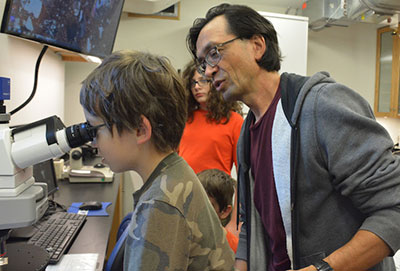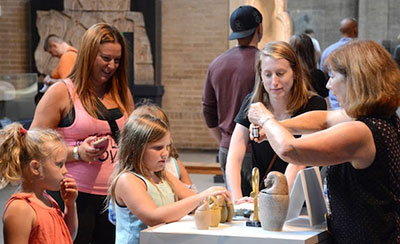Penn Museum Asks "How do We Know?" at Free Family-Friendly Event
Sunday, March 18, 1:00 to 4:00 PM
Museum Event Kicks off Historic University of Pennsylvania Teach-In March 18 to 22

PHILADELPHIA, PA—How do we know what we know? Penn Museum asks that deceptively simple question—and invites guests of all ages to explore answers via hands-on science and archaeology activities, short gallery talks by curators, a scavenger hunt, and more at a free event on Sunday, March 18, 1:00 to 4:00 pm.
How Do We Know? An Afternoon of Learning and Fun in the Penn Museum is the kickoff event to the five-day multi-disciplinary University of Pennsylvania Teach-In on the Production, Dissemination, and Use of Knowledge, organized by Penn’s Faculty Senate. The first university-wide program of this type in half-a-century, the Teach-In—open to students, faculty and the community—comes at a time when journalism is being battered over claims of “fake news,” academics are increasingly under fire for “biased” research, and social media disrupters make it hard to know where information comes from and what to believe. The Teach-In runs from Sunday, March 18 through Thursday, March 22.
More details on the University of PennsylvaniaTeach-In are online. The full schedule of events is online: www.upenn.edu/teachin.
An Afternoon of Inquiry at the Penn Museum
Gallery talks and tactile activities for all ages are part of the afternoon, set throughout the galleries of the Museum.
Penn Museum’s Center for the Analysis of Archaeological Materials (CAAM), opened in 2014, introduces and trains Penn students in the analysis of archaeological materials, and supports archaeological fieldwork and research by training students in the collection and analysis of specimens and data. For the afternoon event, several CAAM instructors bring equipment to the galleries, including low and high-powered microscopes and a 3-D scanner, inviting guests to explore ways that scientists can learn about our ancient past by studying diverse materials, from ceramics, ancient plants, animal bones, and metal objects.
Can trees be calendars? That is a question earlier Penn Museum scientists had, as they helped to develop the field of dendrochronology, or tree ring dating. Guests will have a chance to learn more at an interactive science station on the subject.
Experimental archaeology is one way that scholars field test theories about the ancient past, and guests can try their hand at weaving via Iron Age-style looms at a science station.

Penn Museum has a collection of about 25,000 clay cuneiform tablets with some of the earliest writing in the world, including literature, economic, and administrative texts that provide a window into ancient Mesopotamian cultures. How were they made? Philip Jones, Associate Curator and Keeper of the Babylonian Section, offers a cuneiform making workshop, where guests have the opportunity to scribe like a Sumerian—and take their tablets home.
A matching game asks guests to engage in some playful deduction, matching modern objects to ancient objects created for similar purposes.
Museum cartifacts invite guests to get curious about the collections, and what objects can tell us when we employ close observation—and a little guidance by trained cartifact volunteers. Cartifacts with touchable replica artifacts from ancient Egypt, Mesoamerica, and the ancient Roman world are open for exploration.
Exhibitions Reconsidered in Pop Up Talks by Curators
In many ways, the Museum’s galleries are the ‘public performance’ of its research. Three exhibition curators offer short “pop up” talks about just that in the galleries they curated. Archaeologist and curator Megan Kassabaum, curator of Moundbuilders: Ancient Architects of North America, talks about how the work of archaeologists at mound sites around the country is expressed in the special exhibition. Lucy Fowler Williams, curator of Native American Voices: The People, Here and Now, talks about her work with Native Americans, looking for ways to use the Museum’s collections to tell the stories most important to them. Lauren Ristvet, co-curator, Cultures in the Crossfire: Stories from Syria and Iraq, talks about how the multiple goals of the exhibition—including exposing the loss of cultural heritage and lives in the region, and telling stories of the efforts to halt such loss—were made manifest through the exhibition presentation, including the inclusion of art by a contemporary Syrian artist.
Penn Museum conservators employ many techniques refined over time to clean and repair ancient artifacts in the Museum’s extensive collection, and guests can watch them at work when visiting The Artifact Lab: Conservation in Action00. Twice daily, the conservators open up their window, inviting questions and discussions.
Building on Knowledge
Scientists examine, experiment, test their hypotheses and eventually build upon the knowledge they gain. Guests can strengthen their newfound knowledge from the day when they take a museum-wide scavenger hunt of discovery – with prizes!
SCHEDULE:
Ongoing Activities 1:00 to 4:00 pm
- Archaeological Science in Pepper Hall
- Study ceramics under the microscope
- Study ancient plants under the microscope
- Explore new ways of experiencing ancient objects with a 3D scanner
- Investigate how ores are transformed into metal objects
- Understand more about ancient food through animal bones
- “Can Trees be Calendars?”
- Experimental Archaeology in the Mosaic Gallery
- Matching Game: Modern/Ancient Objects
- Iron-age loom: Try a hands-on weaving/textile experience
- Write on a cuneiform tablet
- Cartifacts: Touchable replica objects in Egypt, Mesoamerica, and Rome Galleries
- Museum-wide Scavenger Hunt
- Apply what you’ve learned through collections in the galleries
- Pop-Up Curator Talks in the Galleries
- 1:15 and 2:00 pm Moundbuilders: Ancient Architects of North America
- 1:30 and 2:15 pm Native American Voices: The People, Here and Now
- 1:45 and 2:30 pm Cultures in the Crossfire: Stories from Syria and Iraq
- 3:00 – 3:30 pm Meet the Conservators at The Artifact Lab Open Window
About the Penn Museum
The Penn Museum (the University of Pennsylvania Museum of Archaeology and Anthropology) is dedicated to the study and understanding of human history and diversity. Founded in 1887, the Museum has sent more than 300 archaeological and anthropological expeditions to all the inhabited continents of the world. With an active exhibition schedule and educational programming for children and adults, the Museum offers the public an opportunity to share in the ongoing discovery of humankind's collective heritage.
The Penn Museum is located at 3260 South Street, Philadelphia, PA 19104 (on Penn's campus, across from Franklin Field). Public transportation to the Museum is available via SEPTA's Regional Rail Line at University City Station; the Market-Frankford Subway Line at 34th Street Station; trolley routes 11, 13, 34, and 36; and bus routes 21, 30, 40, and 42. Museum hours are Tuesday through Sunday, 10:00 am to 5:00 pm, and first Wednesdays of each month until 8:00 pm, with P.M. @ PENN MUSEUM evening programs offered. Closed Mondays and holidays. Admission donation is $15 for adults; $13 for senior citizens (65 and above); free for U.S. Military; $10 for children and full-time students with ID; free to Members, PennCard holders, and children 5 and younger.
Hot and cold meals and light refreshments are offered to visitors with or without Museum admission in The Pepper Mill Café; the Museum Shop offers a wide selection of gifts, books, games, clothing and jewelry. Penn Museum can be found on the web at www.penn.museum. For general information call 215.898.4000. For group tour information call 215.746.8183.
###
About the Penn Museum
The Penn Museum’s mission is to be a center for inquiry and the ongoing exploration of humanity for our University of Pennsylvania, regional, national, and global communities, following ethical standards and practices.
Through conducting research, stewarding collections, creating learning opportunities, sharing stories, and creating experiences that expand access to archaeology and anthropology, the Museum builds empathy and connections across diverse cultures
The Penn Museum is open Tuesday-Sunday, 10:00 am-5:00 pm. It is open until 8:00 pm on first Wednesdays of the month. The Café is open Tuesday-Thursday, 9:00 am-3:00 pm and Friday and Saturday, 10:00 am-3:00 pm. On Sundays, the Café is open 10:30 am-2:30 pm. For information, visit penn.museum, call 215.898.4000, or follow @PennMuseum on social media.



